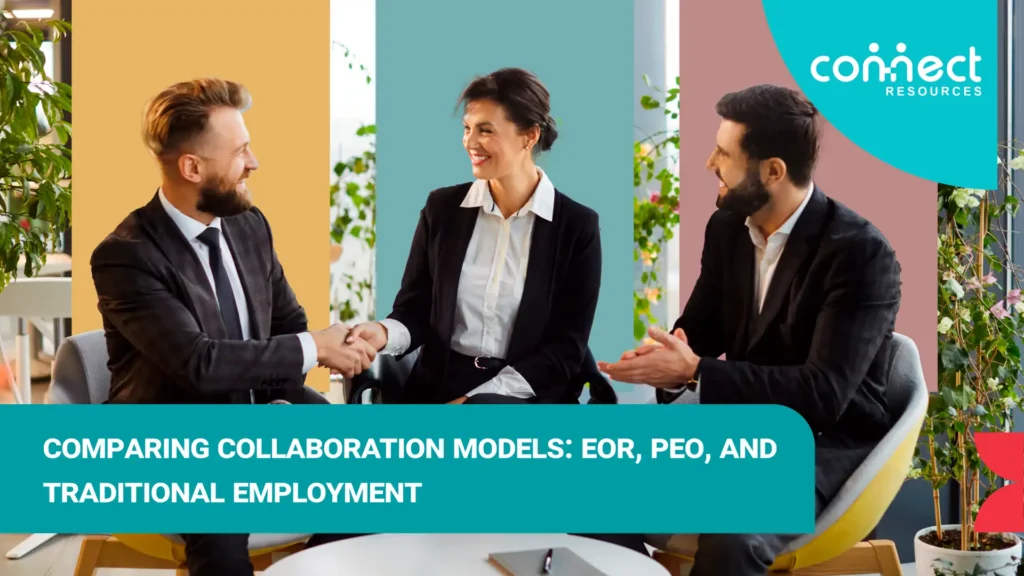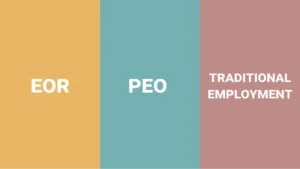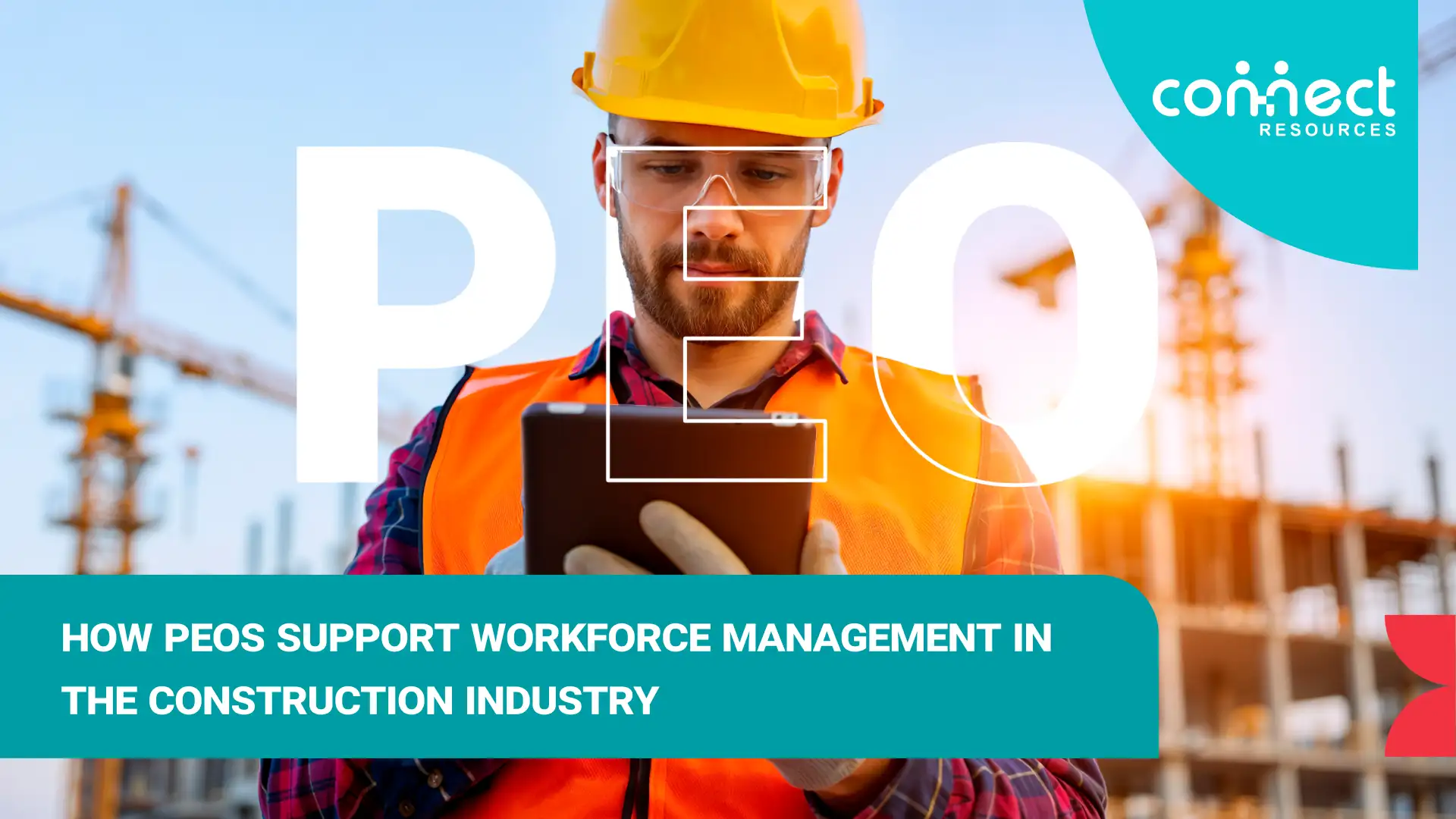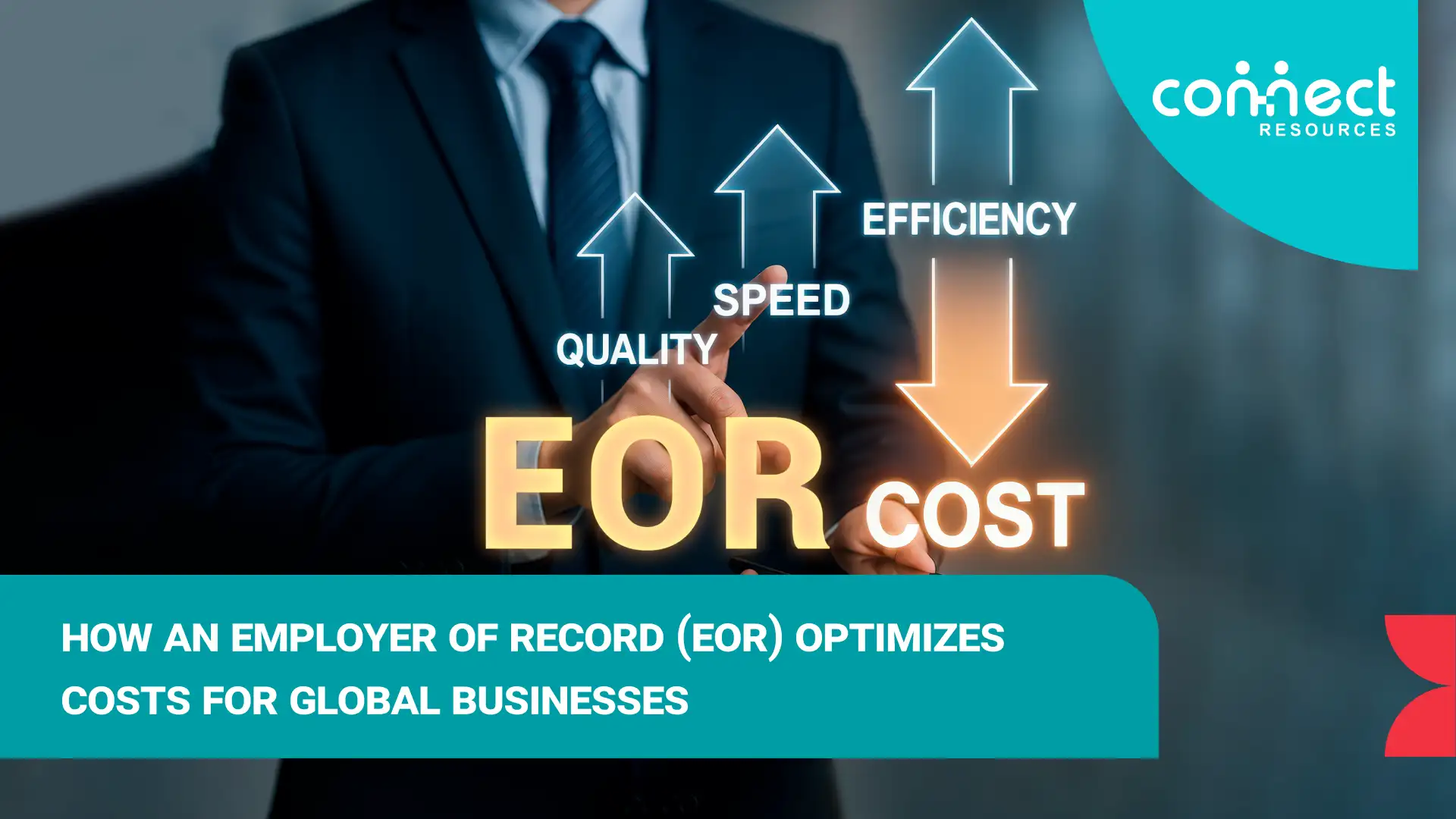Are you planning to expand your team to gain success in international business? If yes, you may be wondering about managing HR operations overseas. And for this, you may have heard about different employment models but are feeling confused about which one to choose.
There are real differences in EOR, PEO, and traditional employment models in terms of services, cost, work visas, and risks that you need to consider. Each of these models offers unique solutions for managing employees and knowing which option best suits your business can help streamline operations and ensure compliance with local laws.
In this blog, we will compare all these different collaboration models to help you find the best one for your global business growth.
Take a look!
Understanding the Basics: EOR vs. PEO vs. Traditional Employment
Here is the basic comparison of various employment models:
EOR – Employment of Records
EOR (Employer of Record) is a service provider that legally employs workers or team members in a foreign country on your behalf. With an EOR employment partner, you don’t need to set up foreign legal entities as you expand globally. EOR professionals have detailed and latest knowledge of local labour laws, legal regulations, and employee benefits. In addition, the EOR provider is an expert in handling visa renewals and work permits. This helps in avoiding unnecessary lawsuits and costly penalties.
Rather than just an extension of your HR department, a quality EOR acts as a full-service partner by providing you with the following services:
- Drafting and signing employment contracts
- Ensuring compliance with local labour laws
- Helping with visas and work permits
- Payroll management
- Employee benefits administration
- Providing mandated employee benefits
- Onboarding and offboarding
PEO – Professional Employer Organisation
A Professional Employer Organisation (PEO) partners with you in a co-employment relationship. In this employment model, PEOs handle administration while you are responsible for controlling day-to-day business operations. Additionally, PEOs provide specialised tools for managing employee onboarding, offboarding, and termination. PEO solutions allow you to make important decisions based on outcomes, employee data, and performance. Here is the list of services a PEO partner offers to businesses:
- Payroll services
- Manage employees
- Support recruitment, hiring, and onboarding processes
- Ensure adherence to local labour regulations
- Manage employee training and development
- Employee visa and work permit processing
Traditional Employment
In the traditional employment model, you or your company is responsible for all HR services and administrative tasks. In this, employees work directly under your company’s name. There is no third party or partnership involved. The following are some important characteristics of this HR model:
- Processing payroll
- Employee onboarding
- International hiring
- Benefits packages
- Talent retention
- Managing employee contracts
- Handle legal disputes
- Workers’ compensation
Key Differences Between Collaboration Models EOR, PEO, and Traditional Employment
Here are some differences between the three models based on services and liabilities:
Legal Employer Status
- Traditional Employment: Your company holds the legal employer status and is responsible for all HR and administration operations.
- PEO: In this, your company remain the primary employer, and PEO becomes a co-employer. PEO handles HR tasks and compliance while your company still holds legal responsibility for the employees.
- EOR: In this model, EOR becomes the official legal employer that partners with your company to handle all legal and administrative responsibilities of employment.
Compliance and Liability
- Traditional Employment: Your company takes full responsibility for compliance with local employee laws, employee benefits, and other legal obligations. Failure to comply can result in hefty fines, costly penalties, or strict legal action.
- PEO: In this, PEO shares responsibility for compliance and liability, especially for employee benefits and HR duties. However, you retain complete liability for business-related issues, including onboarding, offboarding, employee performance and business operations.
- EOR: The EOR client company is fully responsible for compliance and legal liability related to local employment laws, such as payroll, benefits, worker’s compensation, paid leaves, etc. In this model, your company is not liable for employment-related compliance issues.
Control Over HR Functions
- Traditional Employment: Opting for this model gives your company complete control over HR operations, including hiring, employee onboarding processes, benefits management, payroll processing, and more.
- PEO: In this, PEO shares control over HR functions with your company. The PEO manages administrative tasks, and you retain control over workforce scaling, global talent strategy, recruitment, termination, and day-to-day employee management.
- EOR: Working with EOR relieves you from managing a global team as it takes full control over human resources management. You just need to provide general guidance on employee requirements and work culture. This saves you valuable time to focus on core business operations.
Cost Implications
- Traditional Employment: When you hire an in-house HR team, you need to bear all costs for HR softwares, training, office space, computer systems, health insurance, compliance, and more.
- PEO: With PEO, you may need to pay a service fee or a percentage of your payroll to the PEO provider. This is a great model if you want to reduce overall HR costs because the PEO or manpower outsourcing company often offer lower rates for employee benefits and insurance.
- EOR: The EOR charges a fee for handling all employment-related responsibilities and HR functions for your company in a foreign country. These costs are often lower than hiring an in-house team or setting up a legal entity. Also, there are no hidden costs when you partner with a trusted EOR for global business growth.
Scenarios for Optimal Use
Following are some scenarios for choosing PEO services, EOR employment model and traditional employment:
When to Choose Traditional Employment
Traditional employment can be best if you want to invest in long-term growth and want complete control of hiring, payroll, training, employee benefits, and HR services. Consider traditional employment in the following situations:
Large companies with good budgets: Traditional employment works best for companies that can handle multiple administrative duties. Due to long-term commitment, this employment model can be expensive and requires a specific budget. You need to train teams and employees for specific roles. Moreover, continuous improvement is required to align workflow tasks and employee outcomes when you hire global employees.
Established in-house HR department: If you have an established HR department that is capable of handling the international employee onboarding process and the global team, then you can opt for this model. With this, you can be in direct contact with employees or top management to improve business outcomes.
However, this model requires proper control, stability, and expertise. Proper data management software and tracking tools are needed to monitor employees.
When to Choose a PEO Solution
Here is when you can choose PEO business model.
Outsource HR: PEO is best for small to medium-sized businesses that want to outsource HR. This allows HR administration to be co-employees while following company practices. It is best for companies that do not want to lose complete control. PEO can be a good option for businesses that want to focus on day-to-day tasks without managing full HR services.
Regular employee training: PEO is the right fit for your company when you want to train employees for new updates and want compliance assistance for them. This works well if the company understand its legal boundaries and formalities. PEO works for a business if it already has a legal identity to hire employees. Therefore, this outsourcing HR model is best if you are planning to hire a local team.
When to Choose an EOR
Working with an EOR provider is often the best choice for businesses looking to enter the international market quickly. Here are some scenarios where an EOR employment model might be the right fit for your business:
Startups or SMEs want global expansion: EOR employment partners can be the best HR model if you want international expansion. EORs handle compliance, take full control of legal formalities, focus on employee benefits, help with employee visas and work permits, manage the workforce, and handle HR functions.
Market testing: When you want to test a new market without establishing an entire legal entity, an EOR lets you recruit talent and try out the market effectively.
Compliance concerns: If you’re unfamiliar with local regulations and laws, an EOR mitigates liability by ensuring your business hiring is compliant.
For example, if you want to establish a business in UAE without actually moving there, then you may be worried about compliance concerns. In this case, EOR in Dubai can be great for you. They have every knowledge needed to comply with employment laws in UAE. This way, you can hire a skilled workforce without any need to establish itself as a legal entity in the UAE or without getting into legal trouble.
Advantages and Disadvantages of Different Employment Models
Following are the advantages and disadvantages of popular HR models:
Traditional Employment
Here are the advantages and disadvantages of traditional employment:
Advantage
- It fosters personal relationships between your company and employees, enabling easy communication and quick follow-up with management’s orders.
- This employment model allows you to hire global employees with relevant skills, ensuring a skilled workforce.
- It helps in maintaining the workforce by providing regular motivation through training and rewards.
- Ensures compliance with international regulations and employer responsibilities through effective employee onboarding processes.
Disadvantages
- This employment model is resource-intensive and requires constant attention and effort for smooth operations.
- All legal and administrative burdens, including international compliance and compliance liabilities, are on your company, which can be overwhelming.
- It may not be a good option for startups and SMEs when trying to set up a team in a foreign location.
PEO
Here are the advantages and disadvantages of PEO:
Advantages:
- PEO helps in saving resources and extra effort in handling all HR responsibilities.
- It is a shared model that promotes joint effort to improve employees’ output and the company’s growth.
- You can access expert-led support to make administrative tasks smoother.
- Companies benefit from cost savings through efficient management of HR duties.
- PEO provides international and domestic HR support to businesses, ensuring smoother operations.
Disadvantages:
- PEO can sometimes lead to cultural misalignment, as it hires based on time and job requirements.
- It does not handle employee hiring, onboarding, and offboarding but provides support with tools.
- PEO model may not be good for long-term employment.
- Minimum employee requirements may limit the companies that can use PEO effectively.
EOR
Here are the advantages and disadvantages of EOR:
Advantages
- EOR handles all legal complaints, administrative duties, and local laws.
- It follows a centralised approach for payroll and reduces the chances of error due to data loss.
- This model helps in avoiding the cost of setting up a legal entity.
- It can help set up businesses at multiple locations with different time zones.
Disadvantages
- EOR can cost you more as it handles complete HR functions and responsibilities.
- It may face challenges in aligning new hires with the company cultures.
- Some EOR companies can become rigid due to a lack of flexibility.
Which Employment Model Should You Choose?
So, which employment model should you choose? The answer lies in your business needs, budget, and goals. If you are a startup struggling to manage employee benefits, the recruitment process, onboarding, offboarding, or payroll management, then an EOR might be a good option.
An EOR is the sole employer, assuming all legal and administrative responsibility for temporary personnel. It offers the best professional liability protection and specialised services tailored to your industry. With no strict conditions for business requirements, reliable and trusted EOR partners like Connect Resources offer a flexible solution for businesses of any size. With registration in multiple states and countries, EORs relieve you from the burden of business registrations, employee visas, work permits, and more.
If you want to manage employees but are looking for support to save time and manage payroll, PEO can be your option. PEOs operate as co-employers, providing services to almost every industry that wishes to create a global team. The main services of PEOs include payroll processing, employment administration, and employee benefits, with some support for HR operations.
If you feel you have enough time and money to hire an in-house HR team, then traditional employment is always there to choose. But, with this, you will be responsible for everything from hiring to managing employees and the payroll process.
Final Words
Now, you know everything about all three employment models, so choose one that meet your company’s unique needs, especially regarding compliance with employment laws, HR management practices, and workforce flexibility. EOR (Employer of Record) services simplify compliance by handling payroll, and legal responsibilities, making it ideal for businesses that want to hire remote workers without navigating complex employment regulations in foreign country.
Meanwhile, a PEO (Professional Employer Organization) partner offers a comprehensive suite of services, such as benefits administration and human resources management. Choose option wisely. If you need help with managing a team in UAE or Dubai, then Connect Resources can be your best option.
We provide best PEO services and EOR services in Dubai, UAE for all industries.









